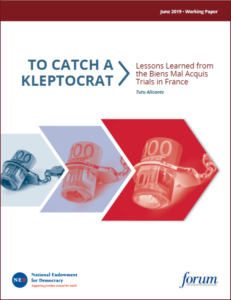
@NDITech
The Covid-19 pandemic has been talked of as a historical rupture, igniting system change. Yet, the nature of the new world being born is still far from certain, and this new historical conjuncture provides considerable opportunities for the further embedding of authoritarianism and new attacks on democracy, according to a new report from the LSE Conflict and Civil Society Research Unit.
The Coronavirus crisis has massively aggravated the existing systemic risks facing the international order. Prior to the crisis a powerful global tendency towards authoritarian governance already existed. While there is considerable hope, and even expectation, that Coronavirus will bring about a system-change, the new global authoritarianism can also adapt to this changing context, Dr Guy Aitchison and Dr Luke Cooper write in Covid-19 and the new authoritarianism.
The report identifies four threats to democracy:

ICNL
1. ‘Deglobalisation’ takes a nationalist form
…..This could undoubtedly be managed in progressive ways with a new approach to global multilateralism. This would be a form of multilateralist deglobalisation: a managed retrenchment in international capital freedoms that restored greater democracy to states and regions. But given the global support for authoritarian regimes there is a danger that the form deglobalisation takes is politically and economically nationalist: throwing up barriers to the movement of people, persecuting minorities and beggar-thy-neighbour economic policies towards other states.
2. Less democratic participation, more centralisation
The nation-state has demonstrated its importance in the Covid-19 crisis. This reflects a certain institutional reality in how politics works: it is embedded within particular locations with distinctive identities and citizenship regimes. ….. Nationalism substitutes for greater substantive involvement in political decision making through the mobilisation of identity politics. This has already become a norm of political mobilisation in many states, cohering a form of governance based on greater autocracy. There seems little reason to believe that a strategy, which has proven successful for those that use it, will not continue in the years ahead and requires a robust challenge by democratic forces.

National Endowment for Democracy (NED)
3. Surveillance state and erosion of human rights
Covid-19 can be situated as part of a package of ‘organic’, i.e. genuine, threats to human security that are prone to instrumentalisation by forces hostile to the protection of human rights. …The major danger going forward is that popular support for human rights still rests on weak foundations in society. While populations will often lack trust in public authorities (itself a problem driving populist voting), this rarely translates into support for a human rights agenda that provides some protections for individuals and vulnerable groups from state coercion.
 4. Inequality goes unchallenged
4. Inequality goes unchallenged
The convulsions of capitalism we are living through are increasingly settling upon a particular political form: an authoritarian and kleptocratic state….New authoritarians play a particular role in this context. They do not propose reforms to substantially alter the economic model. Their criticism of globalisation is limited to its alleged embrace of multiculturalism, cosmopolitanism and open borders. They also oppose the international cooperation needed to confront tax evasion and promote financial transparency. And in domestic politics, by turning attention away from economic inequalities towards the persecution of the marginalised, they can play a helpful role in upholding the oligarchic global system.
The analysis goes on to identify four feasible responses to democratic erosion or the assault on monitoring democracy. RTWT
 The New Authoritarianism: COVID-19 and the challenges facing democracy is the subject of a forthcoming LSE forum at the Conflict and Civil Society Research Unit (@LSE_CCS) – . RSVP
The New Authoritarianism: COVID-19 and the challenges facing democracy is the subject of a forthcoming LSE forum at the Conflict and Civil Society Research Unit (@LSE_CCS) – . RSVP
Guy Aitchison (@GuyAitchison) is Lecturer in Politics and International Studies at Loughborough University and a co-author of Covid-19 and the new authoritarianism (LSE CCS, 2020). Luke Cooper (@lukecooper100) is a consultant researcher in the Conflict and Civil Society Research Unit and co-author of Covid-19 and the new authoritarianism (LSE CCS, 2020). Nadine El-Enany (@NadineElEnany) is Senior Lecturer in Law, Co-Director of the Centre for Research on Race and Law and author of (B)ordering Britain: law, race and empire. Shalini Randeria (@IWM_Vienna) is the Rector of the Institute for Human Sciences (IWM) in Vienna, and the Director of the Albert Hirschman Centre on Democracy. Mary Kaldor (@KaldorM) is the Director of the LSE Conflict and Civil Society Research unit. Her most recent book is Global Security Cultures.
Twitter Hashtag for this event: #LSECOVID19







